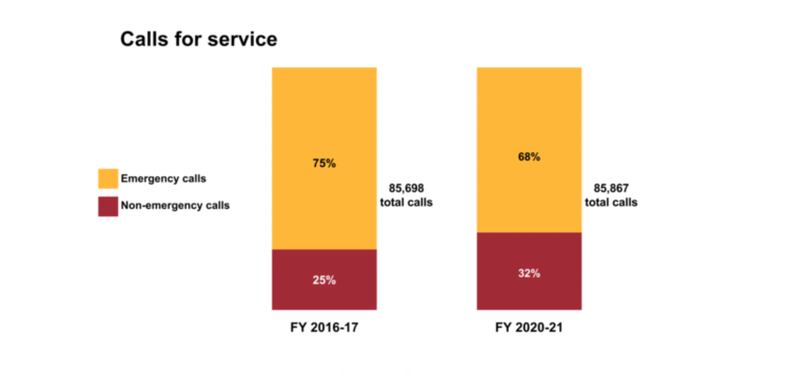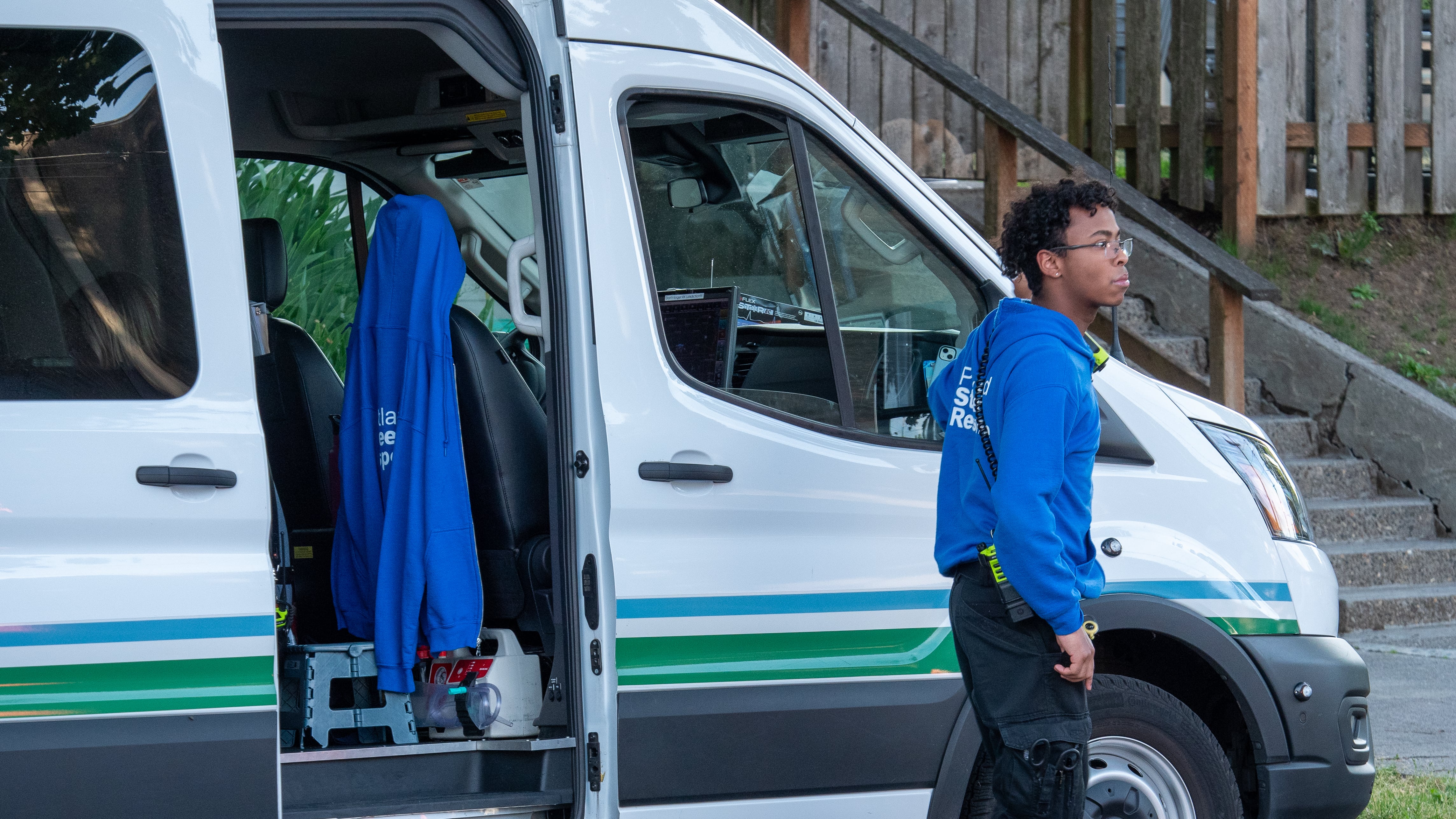Portland City Auditor Simone Rede today released an audit of Portland Fire & Rescue’s efforts to respond differently to certain 911 calls that involve people experiencing mental health crises or low-acuity medical issues.
The audit, conduced during the first half of 2023, looked at two programs: Portland Street Response, which deals with mental health calls, and Community Health Assess & Treatment, or CHAT, which handles low-acuity medical calls.
“Maximizing the effectiveness of these programs could meet the needs of Portlanders and relieve some of the workload challenges faced by the Fire Bureau’s traditional fire crews,” Rede said. But the audit found that potential has not been realized.
At the time Rede’s auditors examined the programs, they were part of the fire bureau’s Community Health Division. They have subsequently been folded into the Medical Services & Training Division, under new leadership.
But in the form that PSR and CHAT existed prior to that reorganization, auditors found that the fire bureau did little to create conditions for their success.
“Although we identified several factors that contributed to shortcomings in the fire bureau’s goal setting, planning, assessment, and adjustment of the Community Health Division and its programs, all of these issues were exacerbated by its inconsistent commitment to the programs and their potential,” auditors wrote.
Interestingly, Interim Fire Chief Ryan Gillespie did not dispute auditors’ criticism that the bureau failed to manage the two initiatives effectively. Instead, he disputed the purpose of those initiatives.
“I take strong exception to the report’s assertion that a goal of Community Health is to reduce the workload of frontline crews,” Gillespie wrote in his response to the audit.
“The common denominator between PSR and CHAT is that neither program was designed to reduce firefighter workload. While CHAT does provide frontline crews with some relief from lower-acuity medical calls, this is an added benefit of our relationship with CareOregon [the Medicaid health services provider that funds CHAT], not a CHAT program goal or performance metric of our agreement.”
Auditors saw things differently. “Portland Street Response and CHAT were each created to achieve specific objectives,” they wrote. “According to documents we reviewed, in addition to their patient-centered goals, those objectives included reducing the low-acuity call burden on traditional fire crews.”
As the new audit notes, 63% of the roughly 86,000 calls to which the fire bureau responds each year have nothing to do with fires. Almost a third of all those calls are non-emergency calls. The percentage of non-emergency calls has grown sharply over the past four years, as the chart below shows.

“Responding in the traditional way, with a fire engine or truck, as well as an ambulance, is expensive and frequently too much for what the situation demands,” auditors wrote. “Portland Fire & Rescue leadership, members of City Council, and outside experts have stressed the importance of addressing the high volume of low-acuity (less serious) calls that wear down fire crews and contribute to slow response times in true emergencies.” (This month, the fire bureau will begin sending two-member teams to drug overdoses downtown, instead of a truck.)
Auditors characterized the formation of the Community Health Division in 2021 as an opportunity to do things differently, with benefits for the public and overworked firefighters.
“Portland’s high volume of low-acuity EMS calls can make fire bureau units unavailable to respond to the most critical emergencies requiring their expertise and contribute to slower response times, high fire station workloads in some areas, and low employee morale or burnout,” auditors wrote. “Removing some or all of these low-acuity calls from the Bureau’s Emergency Operations Division workload could increase the Fire Bureau’s capacity to better respond to critical emergencies and help improve response times.”
But the fire bureau has been suspicious of PSR, in particular, from the beginning.
It’s an attitude evident in Gillespie’s response. “PSR goals were not created by Portland Fire but were established for Portland Fire by Commissioner Hardesty and Mayor Wheeler,” Gillespie wrote. “PF&R was not offered the opportunity to craft or refine these initial PSR program goals. They were developed outside of PF&R and issued to the bureau for implementation.”
His boss, Fire Commissioner Rene Gonzalez, who defeated Hardesty with the fire union’s endorsement, has been equally frosty toward PSR.
In 2019, when the Portland City Council first approved a PSR pilot program, the unions that represent firefighters and police officers both immediately pushed back. Although officers in both bureaus sometimes grumble about responding to mental health and low-acuity medical calls, neither union wanted to give up any work, or funding.
“We have fear, absolutely, that they want to reduce our staffing to pay for other things,” Jason Lehman, vice president of the firefighters’ union, said at the time. “We are absolutely not in favor of that.”
So what happened? Well, in terms of workload, firefighters’ concerns about PSR were on target.
Portland State University, which has published regular evaluations of PSR, has found that nearly all of the calls to which the initiative responds (about 98.5%) are calls that the Portland Police Bureau would previously have taken. One way to look at that is that fire bureau resources are going to cover what used to be police responsibilities.
The possibility that CHAT could take a significant slice of low-acuity medical calls still remains, although auditors noted CHAT now provides less service than it did the first half of 2023. Auditors also noted that the reorganized Community Health Division now reports to a deputy chief instead of a higher-ranking division chief, marking a downgrade in importance within the bureau.
But in his response letter, Gillespie paints an optimistic picture, noting both PSR and CHAT now have performance dashboards and other metrics and will be part of the bureau’s 2023-25 strategic plan: “We have made tremendous improvements to the management structure and support for PSR and have improved collaboration between CHAT, PSR, and Emergency Operations frontline crews,” he wrote.
Updated at 12:48 pm on Jan. 10 with a response from Fire Commissioner Rene Gonzalez:
Gonzalez thanked Rede and the audit team for evaluating programs that he said reflected Hardesty’s desire to “expand Community Health as quickly as possible.”
“While the urgency may be understandable, the need to ensure these programs are structurally sound, grounded in articulable, actionable goals, and financially cost-effective can no longer be ignored,” Gonzalez wrote. “As commissioner in charge of Portland Fire & Rescue, I am committed to these programs’ long-term success and have full confidence in both bureau and program leadership to guide us there. Your audit serves as an important reminder that sometimes we need to ‘slow down to speed up.’”

